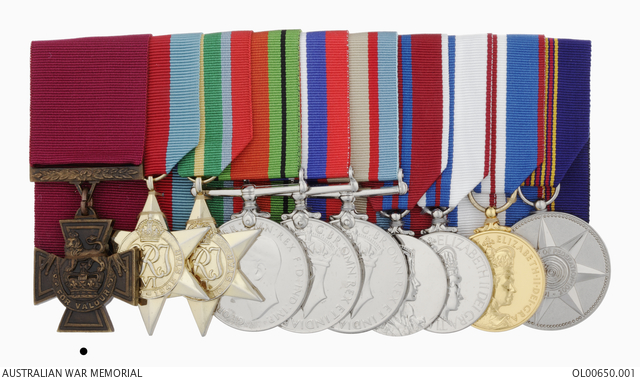| Place | Oceania: New Guinea1, Wewak |
|---|---|
| Accession Number | OL00650.001 |
| Collection type | Heraldry |
| Object type | Award |
| Location | Main Bld: Hall of Valour: Main Hall: Final campaigns |
| Maker |
Hancocks |
| Place made | United Kingdom |
| Date made | c 1945 |
| Conflict |
Second World War, 1939-1945 |
Victoria Cross: Private E Kenna, 2/4 Infantry Battalion

Victoria Cross. Engraved reverse suspender with recipient's details; reverse cross with date of action.
Edward 'Ted' Kenna was born in Hamilton, Victoria on 6 July 1919. One of seven children, he was working as a plumber when he enlisted in August 1940, initially serving with 23/21st Battalion in various locations in Australia. He transferred to 2/4th Battalion in September 1943 and embarked for New Guinea in October 1944.
During the attempt to capture the Wiriu Mission, near Wewak, Kenna’s section was pinned down by heavy fire. Disregarding his own safety, he stood up and fired his Bren gun from the hip until it was empty. As enemy bullets flew around, he called for a rifle and shot two machine-gunners, which gave the attackers the advantage they needed to take the position. For his actions he was awarded the Victoria Cross. The citation for the award reads:
'In the South West Pacific at Wewak on 15 May 1945 during the attack near the Wirui Mission features, Private Kenna's Company had the task of capturing certain enemy positions. The only position from which observation for supporting fire could be obtained was continuously swept by enemy heavy machine-gun fire and it was not possible to bring Artillery or Mortars into action. Private Kenna's Platoon was ordered forward to deal with the enemy machine-gun post, so that the Company operation could proceed. When the attacking sections came into view of the enemy they were immediately engaged at very close range by heavy automatic fire from a position not previously disclosed. Casualties were suffered and the attackers could not move further forward. Private Kenna endeavoured to put his Bren gun into a position where he could engage the bunker but was unable to do so because of the nature of the ground. On his own initiative and without orders Private Kenna stood up in full view of the enemy less than 50 yards away and engaged the bunker, firing his Bren gun from the hip. He remained completely exposed and continued to fire at the enemy until his magazine was exhausted. Still making a target for himself, Private Kenna discarded his Bren gun and called for a rifle. Despite the intense machine gun fire, he seized the rifle and with amazing coolness killed the gunner with his first round. A second automatic opened fire on Private Kenna from a different position and another of the enemy immediately tried to move into position behind the first machine gun, but Private Kenna remained standing and killed him with his next round.
The result of Kenna's magnificent bravery in the face of concentrated fire was that the bunker was captured without further loss. The company attack proceeded to a successful conclusion, many enemy being killed and numerous automatic weapons captured. There is no doubt that the success of the company attack would have been seriously endangered and many casualties sustained, but for Private Kenna's magnificent courage and complete disregard for his own safety. His action was an outstanding example of the highest degree of bravery.’
Three weeks later, Kenna was hit in the mouth by an enemy bullet and spent more than a year in hospital. Once discharged, he married Marjorie Rushbury, who had nursed him at Heidelberg Military Hospital, and they settled in Hamilton. He died aged 90 in 2009.
Kenna's Victoria Cross is accompanied by service medals for the Second World War, coronation and jubilee medals for Queen Elizabeth II, and the Centenary Medal. On loan from a private collection in memory of Second World War veteran Keith William 'Bluey' Bell, Royal Australian Engineers.